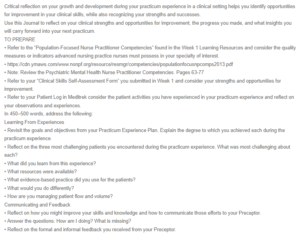Lessons from Psychiatric Nursing Practice
Learning From Experiences
The practicum has considerably improved my knowledge of several aspects. I am now confident in distinguishing psychopathologic disorders from psychophysiological disorders. The contents on the pathophysiological manifestations of these conditions obtained through reading, watching tutorials and videos, and from the practicum, have bolstered my knowledge of these disorders. I am also confident in selecting, interpreting, and implementing various psychiatric evaluation tools. I can now select and interpret various psychiatric evaluation tools accurately. I am also confident in performing a comprehensive psychiatric evaluation. The practicum has taught me the prerequisite skills required in psychiatric evaluation processes, including the language to use and areas to interrogate when performing a comprehensive psychiatric evaluation.
As much as I learned a lot during the practicum, the learning process was not smooth as I encountered some challenging presentations. The first presentation was of a 71-year-old female presenting with complaints of restlessness and fatigue. She was diagnosed with PTSD and scheduled to begin CBT. The second case was of a 48-year-old woman presenting for her routine cancer screening and reporting complaints of feeling depressed. She was diagnosed with bipolar disorder and started on valproic acid. For these patients, I had to adjust my language to suit theirs. As Larsen et al. (2020) report, nurses and other caregivers maintain the obligation to tailor their language to address age and culture-related communication challenges. The third case was of a 17-year-old female with bipolar disorder presenting for her routine management. She was found not to be taking her medications and advised to start taking them.
The practicum widened my perspectives on psychiatric care. It highlighted the significance of interpersonal communication and relations skills among nurses and other caregivers. Handling patients from different age groups or trans-cultural patients may be challenging. Lekas et al. (2020) note that with the diversification of patients presenting for care, cultural humility will help nurses commit to learning other people’s cultures and beliefs, thereby helping them provide quality care.
Several resources were available during the practicum. The Omega Advanced Health Practice has a working hospital library that contains thousands of informative nursing textbooks, journals, and other written nursing documentation. The staff at the hospital are also friendly and ready to engage other professionals in learning processes. An evidence-based practice I used with my patients was to collaborate with other professionals in care delivery. Notably, Samuriwo (2022) notes that partnering with other professionals is one of the best practices in nursing that helps nurses reduce nurse-related errors.
Entering the practicum, one of my goals was to differentiate psychopathologic disorders from psychophysiological disorders. While I used videos and consultations to learn these aspects, I would also consider using case studies. During the practicum, I managed patient flow and volume by ensuring that I availed all resources I required during the process and preparing myself mentally to handle a high volume of patients.
Communicating and Feedback
Moving forward, I intend to use several strategies to improve my skills and knowledge. These include joining a discussion group, employing varied resources such as videos, case studies, and practicums, and consulting my tutors. These strategies will be communicated to my preceptor verbally or through written texts disseminated via email.
I am currently doing good. I am confident in many areas I had difficulties in. I am in a good position and not missing much. However, I feel I should push myself to have a better mastery of all the aspects of psychiatric nursing. Both the formal and informal feedback I have received from my preceptor has had a positive impact on my learning process. Informal feedback often occurs during the learning process and usually ensures that I adjust promptly.
References
Larsen, R., Mangrio, E., & Persson, K. (2020). Interpersonal Communication in Transcultural Nursing Care in India: A descriptive qualitative study. Journal of Transcultural Nursing, 32(4), 310–317. https://doi.org/10.1177/1043659620920693
Lekas, H.-M., Pahl, K., & Fuller Lewis, C. (2020). Rethinking cultural competence: Shifting to cultural humility. Health Services Insights, 13, 117863292097058. https://doi.org/10.1177/1178632920970580
Samuriwo, R. (2022). Interprofessional collaboration—time for a new theory of action? Frontiers in Medicine, 9. https://doi.org/10.3389/fmed.2022.876715
ORDER A PLAGIARISM-FREE PAPER HERE
We’ll write everything from scratch
Question

Lessons from Psychiatric Nursing Practice
Critical reflection on your growth and development during your practicum experience in a clinical setting helps you identify opportunities for improvement in your clinical skills, while also recognizing your strengths and successes.
Use this Journal to reflect on your clinical strengths and opportunities for improvement, the progress you made, and what insights you will carry forward into your next practicum.
TO PREPARE
• Refer to the “Population-Focused Nurse Practitioner Competencies” found in the Week 1 Learning Resources and consider the quality measures or indicators advanced nursing practice nurses must possess in your specialty of interest.
• https://cdn.ymaws.com/www.nonpf.org/resource/resmgr/competencies/populationfocusnpcomps2013.pdf
• Note: Review the Psychiatric Mental Health Nurse Practitioner Competencies. Pages 63-77
• Refer to your “Clinical Skills Self-Assessment Form” you submitted in Week 1 and consider your strengths and opportunities for improvement.
• Refer to your Patient Log in Meditrek consider the patient activities you have experienced in your practicum experience and reflect on your observations and experiences.
In 450–500 words, address the following:
Learning From Experiences
• Revisit the goals and objectives from your Practicum Experience Plan. Explain the degree to which you achieved each during the practicum experience.
• Reflect on the three most challenging patients you encountered during the practicum experience. What was most challenging about each?
• What did you learn from this experience?
• What resources were available?
• What evidence-based practice did you use for the patients?
• What would you do differently?
• How are you managing patient flow and volume?
Communicating and Feedback
• Reflect on how you might improve your skills and knowledge and how to communicate those efforts to your Preceptor.
• Answer the questions: How am I doing? What is missing?
• Reflect on the formal and informal feedback you received from your Preceptor.

